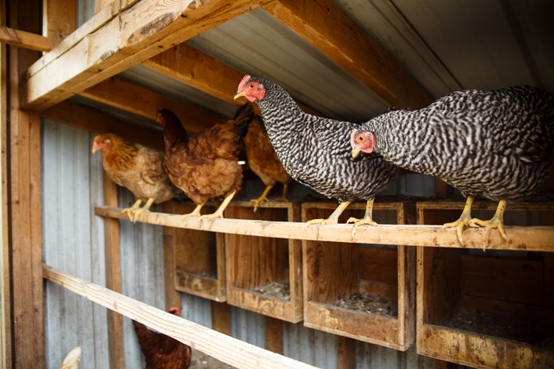Winter Lighting In The Chicken Coop

Winter’s extreme cold can certainly reduce egg production. But darkness is the main reason production begins to slow in late fall.
Research shows that chickens lay best when they receive about 15 hours of light daily. In the northern United States, natural daylight drops to under nine hours at the end of December. To optimize egg production, supplemental (or artificial) lighting in the coop is a must for the next three to four months until the days get longer.
Setting up a simple light, controlled by a timer, solves the problem of waning sunlight. The same silver reflector lamps used for brooding chicks work well for winter light. A nine-watt compact fluorescent bulb is all that’s needed for a typical backyard coop. Plug the light into a timer and have it come on early enough in the morning to give the birds 15 hours of daylight, and egg production will be improved through the shorter days of winter.
Where to Place Lamps?
The distribution of light depends on lamp placement. Place lamps so that maximum illumination is spread over the largest area. In other words, don’t just light the nest box. Hang a bulb or lamp at the top of the coop to spread the light. Also, beware of dirty lamps. They can decrease light output by as much as 15 to 20 percent, so clean lamps at least once a week.
Other Tips for Winterizing Your Flock
- Be certain to have a supply of fresh water; heated waterers save time and labor and assure the birds will always be able to drink
- Make sure a high quality layer ration like NatureWise or Country Feeds is always available. Your chickens need to eat to enough to stay warm and maintain egg production.
- Check that the coop is free from drafts, but don’t compromise ventilation as excessive moisture in the coop can lead to health problems.
- Put a little extra scratch grain down for your chickens morning and afternoon. The treat will keep winter birds busy pecking and scratching for hours and will help prevent boredom and give them some extra energy for warmth.
- With the chickens spending more time in the coop, bedding may become damp. Remove and replace as needed, or on a warmer day. Clean and dry bedding will also help the chickens stay warm and keep odors down.
- Let the chickens out into their run as chickens enjoy going outside, even if it’s cold, but most don’t like to walk on snow or in the rain.
With a little extra light and a little extra attention, your chickens will keep up their winter egg production and before you know it, it will be spring!
